Now we march into the third month of the year, having leapt to our heart’s content in the previous 24 hour period. This is the March 1, 2024 edition of Charlottesville Community Engagement, a newsletter and podcast that now can also be heard on the radio every Saturday morning at 6 a.m. on WTJU 91.1 FM in Charlottesville. I’m Sean Tubbs, glad to be able to do this.
On today’s show:
There’s another delay in the completion of the $38 million Belmont Bridge
Several speakers ask for adjustments in Albemarle County’s fiscal year 25 budget
A group of University of Virginia students suggest reform of the way Charlottesville uses one pot of federal funding
First shout out: RCA seeks support for Spring Watershed Education Program
In today’s first subscriber-supported public service announcement, the Rivanna Conservation Alliance has planned field trips this spring for sixth-graders in Albemarle County where they’ll learn how to monitor water quality in area streams and waterways. But they need volunteers to help make it happen!
So they are recruiting volunteers to work with RCA staff and lead students through a range of activities including:
Benthic macroinvertebrate sampling
Water quality testing
Fun watershed-related games!
RCA will provide training prior to the field trips, and new volunteers will be paired with more experienced volunteers or staff. Do you know someone who would be interested in volunteering? Help RCA spread the word! More information is available on their website at rivannariver.org
First public hearing held for Albemarle’s proposed budget for FY25
Several people spoke at the first public hearing on Albemarle County’s recommended $629 million budget for fiscal year 2025. But first, County Executive Jeffrey Richardson gave a brief recap.
“The theme for this year is really to continue to build the momentum with what we began in fiscal year 2024,” Richardson said.
Budgeting in Albemarle is built on a strategic plan adopted by the Board of Supervisors in October 2022. For a further recap, take a look at my story from last week.
The first speaker thanked the Board for previous funding for the Virginia Cooperative Extension and asked Supervisors to consider more support that Richardson is recommending in the FY25 budget. The agency had requested $283,352 to add a full-time staff member to coordinate 4-H activities but the draft budget recommends $256,902.
“With 4-H participation at its highest level in 20 years, it is evident that our community is looking for what 4-H has to offer,” said Heather Farr. “However, sustaining and expanding these invaluable programs that are free to anyone requires resources and that’s where your support becomes pivotal.”

The next speaker was Dan Rosensweig, the CEO of Habitat for Humanity of Greater Charlottesville. He began by thanking Albemarle for their partnership in developing the Southwood Mobile Home Park.
“This $500 million national model redevelopment without displacement has a long way to go but thus far is exceeding our expectations as well as your own benchmarks,” Rosensweig said. “Nationally in similar redevelopment projects only 11 percent of residents return. At Southwood, the second group of families are the first group that are after the early adopters have made their choices and a staggering 85 percent of families are staying.”
Habitat has a performance agreement with Albemarle County to govern various incentives. Rosensweig said the first agreement required Habitat to deliver 155 affordable units.
“In fact, we’re delivering 215,” Rosensweig said.
However, Rosensweig said it is time for the county to enter into a new performance agreement for the second phase of development which will see construction within the existing mobile home park rather than the adjacent property.
“In anticipation of that, given the severe health and safety issues resulting from failing septic systems, Habitat has spent more than $3 million remediating and clearing the first section of phase 2. More than a 12 acre parcel is now clean. That’s the good news, it’s pristine as warranted by the [Virginia Department of Environmental Quality.] But the tough part is that for us as a nonprofit, this has created extreme cash flow challenges. Really extreme cash flow challenges.”
Rosensweig said this will delay the project and may cause some residents to relocate twice. He did not specify a dollar amount. After he spoke, several residents also appealed for funding.
Gustavo Espinosa is an organizer with the Legal Aid Justice Center and worked to connect Albemarle County residents with rent relief programs during the pandemic. He thanked the county for launching a local financial assistance program but asked for more support.
“$260,000 is not enough,” Espinoza said. “It wasn’t enough this year. Already we’re seeing that there’s less money that’s being given and just from how many evictions there are. There’s 1,330 cases filed last year. So that’s four a day. And these evictions are across Albemarle County.”

When the public hearing was concluded, audience members and the Board got an update on where the process goes next.
“As we transition into March, we have five work sessions planned,” said Jacob Sumner, Albemarle’s chief financial officer. “In April, we’ll move towards our public hearings on the tax rate and on the budget itself and finally we’ll look to May 1 for appropriation and adoption of the budget.”
The first work session on March 6 will go through the general fund budget. On March 11, the focus will be a joint session with the School Board.
“And this is when the public schools will provide their… request to the Board,” Sumner said. “At the end of that conversation we’ll then wrap up with the items that we plan to finish for the general fund.”
The third work session on March 13 will focus on the Capital Improvement Program and the debt service required to pay off the bond proceeds that pay for infrastructure. Details on other work sessions in upcoming editions of the Week Ahead newsletter.
Emergency award granted to Kimley-Horn to extend Belmont Bridge contract
There’s a new chapter in the long-running saga of Charlottesville’s replacement of the Belmont Bridge. According to a status report developed by city staff, the $38 million project was expected to be completed in January. (read the status report)
However contractor Kimley Horn was awarded an emergency contract on February 9 for “bridge construction services, engineering and inspection.” According to a justification submitted on that day, the work is needed for public safety purposes.
“If the contract is not extended, demobilization will occur which will include removing protective barriers on the bridge,” reads the notice posted on the city’s website. “The first concern is the considerable area of fall hazards in the vicinity of pedestrian routes and public gathering areas.”
The notice goes on to say that under the new contract, new barriers will be put in place and “onlooker activity” will be monitored as the project nears completion.
“The pavilion and nearby mall are frequented by gatherings of small children, to whom an unsecured construction site presents an attractive nuisance and dangerous environment,” the notice continues.
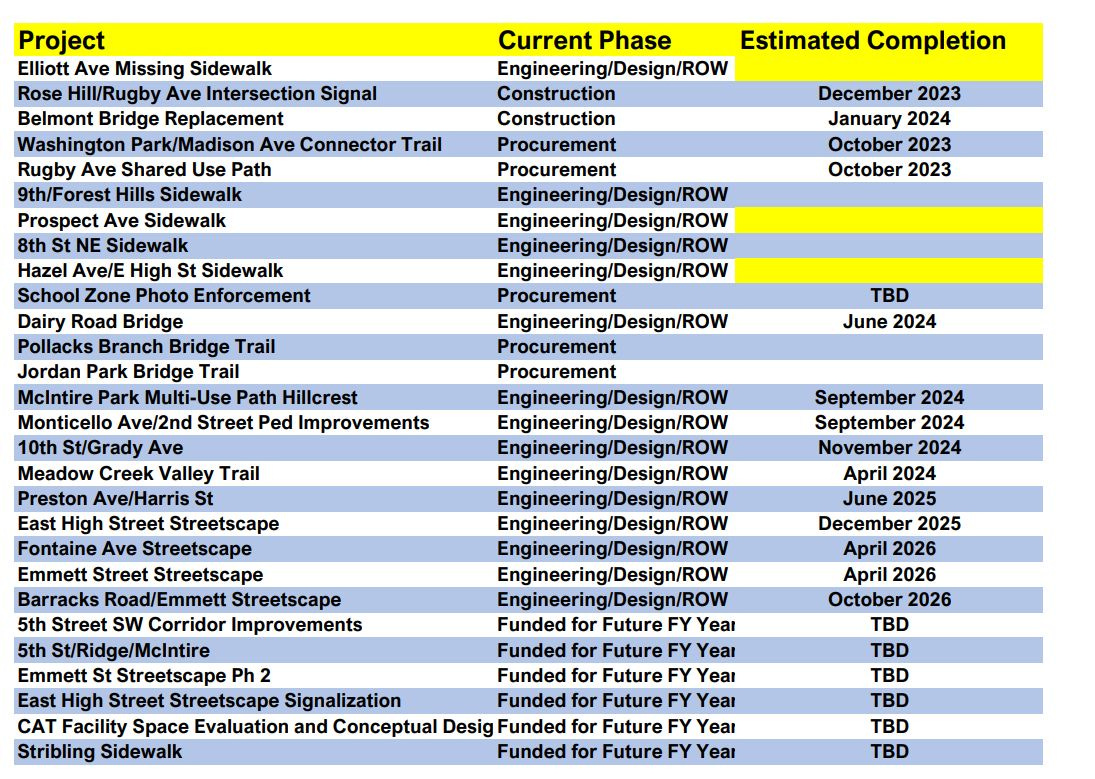
The new bridge is the third structure to span the railroad tracks with the second one having been completed in the early 1960’s. In September 2003, former Mayor Maurice Cox suggested it would be better to replace the bridge with something more pedestrian-friendly. For several years, staff pursued a plan to repair the bridge, but conditions had deteriorated by April 2009 when City Council agreed to proceed with a replacement.
At that time, Council selected MMM Design to develop the bridge and the project had a cost estimate of $9 million. A public process kicked off in November 2010 but in early 2012 filmmaker Brian Wimer began a public campaign to challenge the need for a bridge. The University of Virginia School of Architecture had a school-wide project to come up with alternatives and the winning competition imagined no bridge at all. The now-defunct PLACE Design Task Force recommended the city study the option of an underpass, adding additional cost to the project.
In July 2014, Council selected a replacement bridge anyway, but one with an enhanced pedestrian experience. However, a few months later, MMM Design went out of business and the project went dormant again while the bridge continued to deteriorate. In December 2016, Kimley Horn was hired to begin the process again. In August 2020, the project had a cost estimate of $31 million. Council agreed to $5 million in capital funding in the adopted FY2021 budget and $2.5 million in the adopted FY2022 budget. The project got under construction in the summer of 2021.
The project is among several managed by the City of Charlottesville that are behind schedule. Three projects funded by the Virginia Department of Transportation in the first Smart Scale Round back in 2016 have not yet gone to construction but are in the engineering / right-of-way / and design phase.
East High Streetscape is now expected to be completed in December 2025
Fontaine Avenue Streetscape is now expected to be completed in April 2026
Emmet Streetcape is now expected to be completed in April 2026
This story was generated by a routine check of recent procurement activities. Here are some other recent contract awards made by the City of Charlottesville as well as some open bids:
Contractors interested in purchasing and installing a specific restroom at the city’s Riverview Park have until March 4, 2024 to submit their bid. The model to be installed is a Smith-Midland Easi-Set Sierra Flush Precast restroom. The selected contractor also has to prepare the site, but the city will purchase the drinking fountain. (learn more)
On February 2, the city awarded a contract to Waste Management of Virginia to handle citywide dumpster services (learn more)
On February 14, the city awarded a contract to C&G Paving Incorporated for “construction and repair services related to pathways, trails, courts, parking areas and other surfaces throughout City parks and City managed trail corridors.” (learn more)
Bids closed on February 23 for a firm to have an on-call contract for “asbestos abatement services on an as needed basis.” (learn more)
Second shout out: Lewis & Clark Exploratory Center holding open houses for teachers
In today’s second subscriber-supported shout-out: Are you or someone you know a teacher who is looking for a new way to teach environmental science, history, modern methods of exploration, and more history?
Located in Darden Towe Park along the Rivanna River, the Lewis and Clark Exploratory Center has three open houses coming up where educators can find out what services the nonprofit offers to public, private, and home school teachers. During the Open House events, educators can participate in hands-on activities and talk with experienced guides about program choices, cost, and scholarships. The next free tour is coming up on March 15 and will include the river trails and outdoor classroom.
Visit the Lewis & Clark Exploratory Center’s Eventbrite page to learn more! Teachers can also email lcecvirginia@gmail.com for help with registration.
UVA student group critiques Charlottesville’s use of federal funds on behalf of PHAR
A group of students at the University of Virginia working with the Public Housing Association of Residents has put together recommendations for how the city could better use its allocation of funds from the Community Development Block Grant.
“In 2022, 226 people in the Charlottesville area experienced some form of homelessness,” said Talib Kante. “This is the highest number Charlottesville has seen since 2010. Yet it’s not just the unhoused folk who are experiencing these difficulties. Many residents are facing food insecurity and since the pandemic, the number of people requiring access to free food from soup kitchens and pantries has risen sharply.”
Kante said members of the Charlottesville community want local government to address poverty and he and his colleagues felt reform of how the city uses federal funding could bring about more efficiency. He said his group was contacted by a top official at the Public Housing Association of Residents to do research on their behalf.
“Joy Johnson of PHAR has brought to our attention her concerns with the Community Development Block Grant and the need to reallocate these funds,” Kante said. “We’ve spoken to other people like Todd Niemeier of the [Office of Human Rights] and Mr. John Sales of [the Charlottesville Redevelopment and Housing Authority.”
In addition to being a CRHA resident, Johnson is also employed as the Section 3 Coordinator for the CRHA, a position intended to train public housing residents. Johnson and Sales are both members of the city’s Housing Advisory Committee, with Johnson being a beneficiary of affordable housing. She’s also the HAC’s chair.
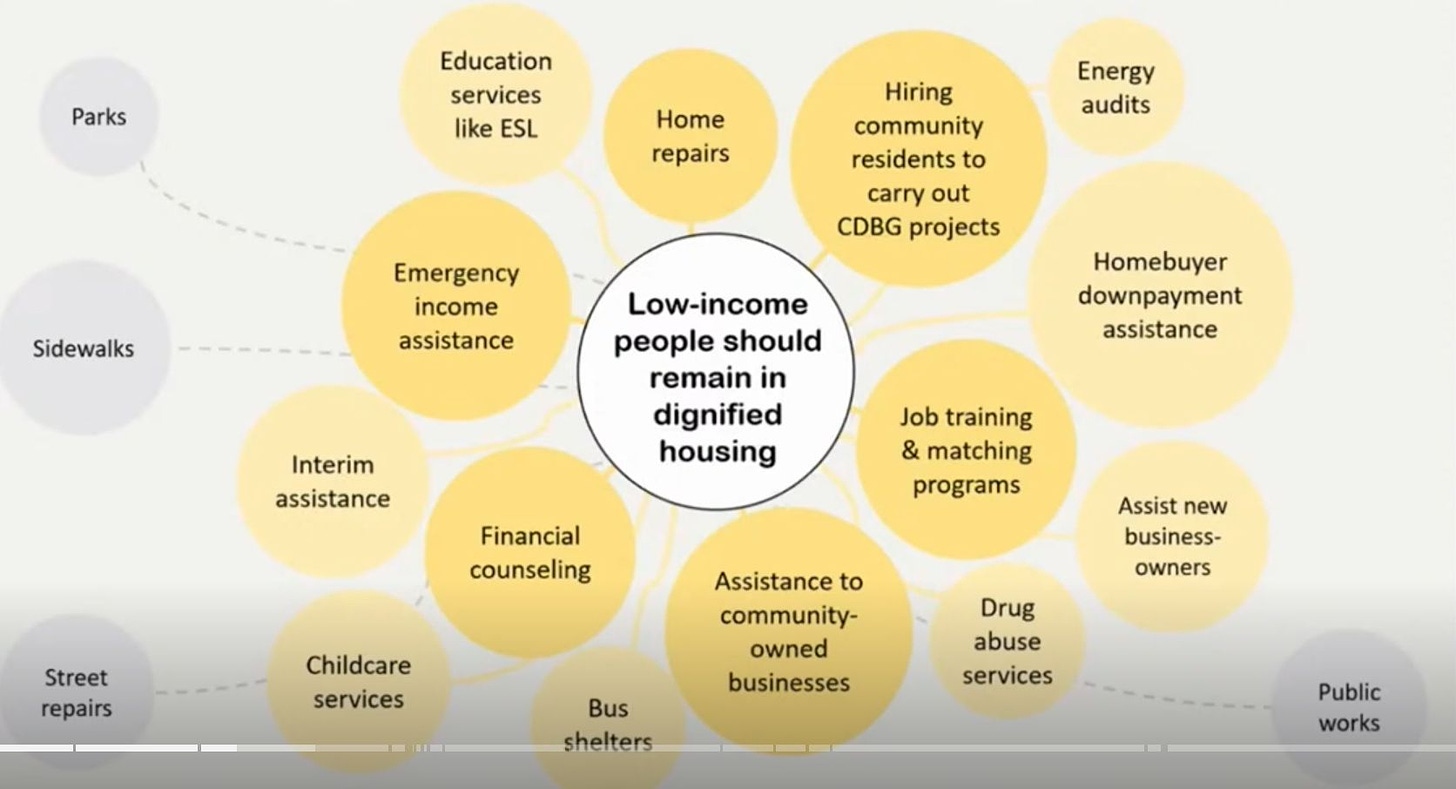
Community Development Block Grants date back to 1974 through the Housing and Community Development Act of that year. The bill was intended to place more decisions in the hands of local officials who would be better positioned to decide what projects should be funded.
“The CDBG program emphasizes residents’ participation in decision making and to empower individuals to address their specific needs,” said Abba Kodiaga. “As Joy often says, CDBG money is poor people’s money which is why at least 70 percent of the CDBG funds should be used to benefit low and moderate income communities.”
Those are specific terms. Low income is generally defined as around 50 percent of the area median income and moderate is 80 percent. Kodiaga said the funding should be used exclusively to benefit individuals and households with extremely low or very low incomes.
The third speaker said the group worked closely with Johnson to review how funding has been spent over the years. Here’s information from the current year.
“The 2023 / 2024 allocation for Community Development Block Grants was around $410,000,” said Laura Kun. “The breakdown we have found on CDBG in city documents states that 15 percent of that budget goes toward public services, 20 percent goes toward administration and planning, and the remaining 65 percent is split evenly among the categories of housing, public facilities / improvements, and economic development.”
Kun said the group was most concerned with the 20 percent that went to administration. She said the money could go toward hiring members of the community to write grants, provide child care for task force members, and training for the task force.
“This 20 percent would ideally be used to maximize community involvement in some way rather than going toward the salary of just one or two individuals,” said the third speaker.
While the presentation to Council broke down funding into categories, the presentation did not include the specific recommendations for FY23 / FY 24 approved by Council on May 1, 2023, which includes $40,000 for PHAR for their “Resident-Centered Development” initiative. According to the minutes, this is listed under “Community Services.”
Under economic development, the Community Investment Collaborative received $25,000 for their microenterprise entrepreneur program. Literacy Volunteers of Charlottesville / Albemarle received $64,477.89 for a program called Beginning Level Workforce Development program.
Under housing, the Albemarle Housing Improvement Program received $40,000 for their Critical Rehab Program. The Haven at First and Market Street received $45,000.
Under programmatic funds, $82,093.60 went to planning and administration. Another $89,896.51 went to help fund the City Council’s priority area for public facilities and improvements.
The fourth speaker critiqued the lack of training for previous task force members. A slide presented said two questionable uses of the funds were $74,000 in August 2022 for smoke detectors as well as $245,000 for a sidewalk project in the Ridge Street neighborhood.
“These examples that are shown on the slide are examples of ways that CDBG funds have been used to fund things that could have otherwise have been funded by the capital project or things that failed to achieve the goal of benefiting low to moderate income level residents,” said the fourth speaker.
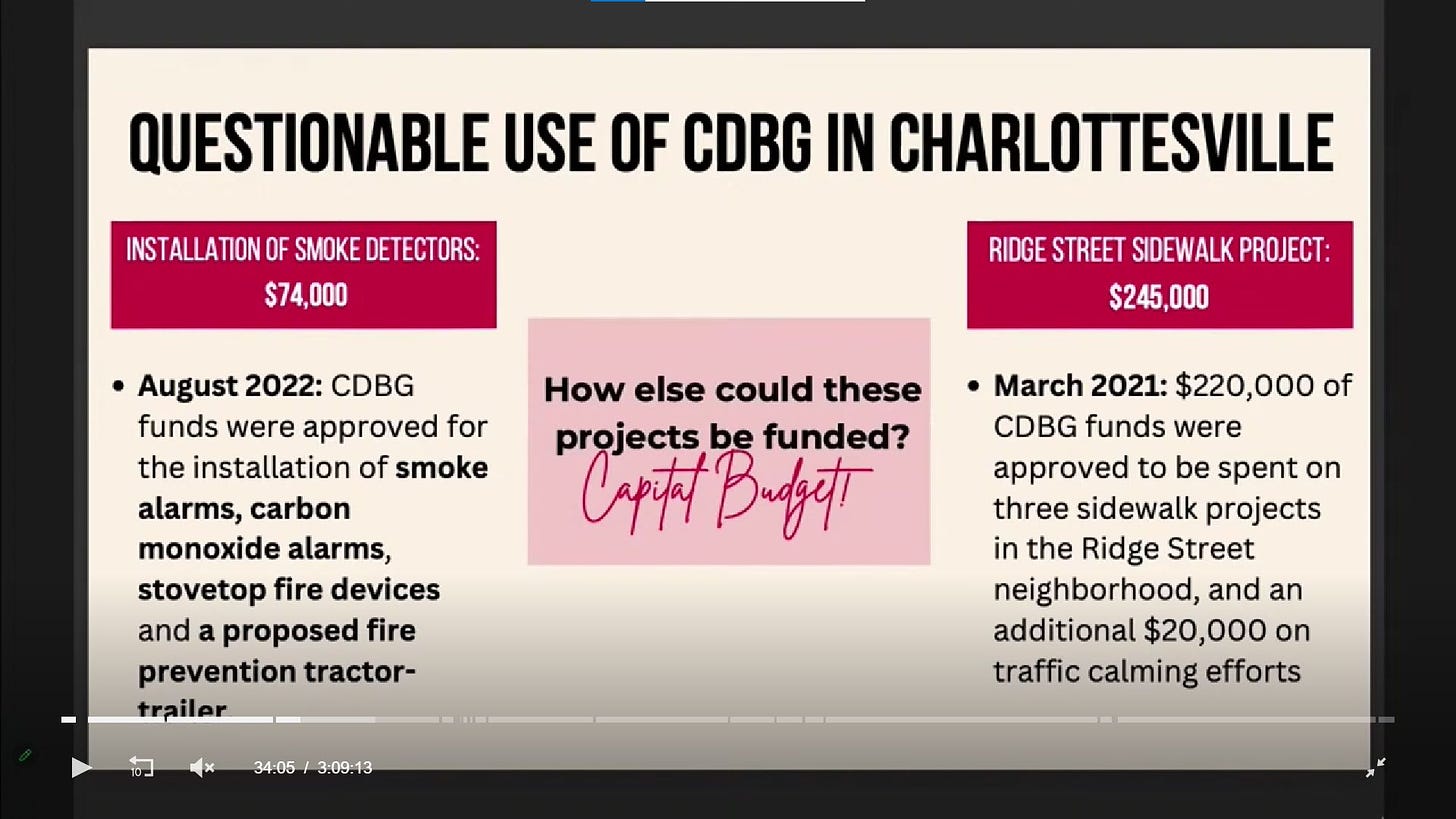
What the presenters didn’t mention is that the U.S. Department of Housing and Urban Development has specific rules on spending money within a certain time period. As I reported in February 2022, the funding for the fire safety project had originally been recommended by the task force for a sidewalk on Franklin Street in Belmont, which at the time was approved by Council as being a priority neighborhood but later canceled in December 2021.
The Ridge Street projects were recommended by a task force and approved by Council in March 2021, as I reported at the time.
“We think it must be analyzed whether or not this was one of the most pressing issues at the time and whether it deserved over half of the CDBG budget,” the fourth speaker said.
Around that time, there was a public campaign for Council to address safety issues on Fifth Street Extended, which extends south from the terminus of Ridge Street. The improvements at Ridge Street had been intended to be part of a series of projects designed to reduce fatalities.
For the sake of expediency, here are two stories I wrote around that time that can provide context. I’ll update this story when the minutes are available.
Petition seeks changes to 5th Street to prevent further crashes, November 11, 2020
Council briefed on ways to slow down Fifth Street Extended, November 17, 2020
The next speaker called upon Council to limit spending to programs that only benefit those with very low or extremely low incomes.
“Home repairs, for instance, are an important project that we think the city should probably prioritize,” said Justin Gabrielle.
Again, the FY 23 / FY 24 allocation included $40,000 for Albemarle Home Improvement Program’s Critical Rehab Program. That information was not presented to Council.
Gabrielle said CDBG funding should not be used for parks, sidewalks, street repairs, and public works.
Students also critiqued the way priority neighborhoods are selected and chosen as well as how task force members are selected.
Council response
Mayor Juandiego Wade agreed that task force members could use more training.
“I was a member as a School Board rep for many years and I had some experience because I had a planning background but a lot of the things we were just thrown into,” Wade said. “That was a few years ago so I think it sounds like more training could be needed.”
City Councilor Michael Payne had been the lone vote against the use of funds for fire safety. He said some reforms had already been made.
“I think we’ve made some changes internally that are preventing that from happening again, hopefully,” Payne said.
Councilor Lloyd Snook pointed out that the closed session scheduled after the February 20, 2024 work session was for boards and commissions.
“We’re supposed to be appointing CDBG Task Force members,” Snook said. “There are in fact three vacancies but we have no applications for them.”
Snook also said sidewalks are an important issue for many and previous allocations reflect public input and also represent an alternate way to get them built in a city that has struggled with sidewalk prioritization and construction.
“So when we end up using CDBG funding for sidewalks, it is because the neighbors there have said that is important to us and so in a sense the CDBG funding for sidewalks is sort of the relief valve if you will,” Snook said. “It’s the other way that neighborhood priorities can get funded.”
Snook said that’s consistent with the purpose of the enabling legislation from 1974 for the Community Development Block Grant.
However, City Councilor Natalie Oschrin said when people who live and work in the city become less dependent on using their cars, the CDBG money will be irrelevant.
“As we move further into more consciousness about being a car driven culture to a bike / ped / bus culture, we’ll be able to spend more on sidewalks and other projects so that we don’t need that relief valve,” Oschrin said.
The next meeting of the Community Development Block Grant task force is to be determined according to the website.
To conclude this story, I wanted to track down some projects funded through CDBG. I began by seeking City Council minutes but did not get far. I don’t report from memory and require confirmation before I state information. Here’s a very small list:
In 2008, Council approved $20,947 for traffic calming on Tenth Street as well as $25,000 toward signage on Ridge Street. (minutes)
In 2009, Council approved $103,924 for AHIP for homeowner rehab (minutes)
I hit a snag here because the Council minutes for June 5, 2011 and June 20, 2011 do not identify what programs were allocated. Digital copies of agendas for meetings before 2014 are no longer available. My request was forwarded to the FOIA office, and I’ll see how much they’ll charge me to do that research. Meanwhile, I’ll continue to do my own research and maybe I’ll charge the city for the costs of reproducing work that never should have been deleted in the first place?
In any case. That’s the end of the show.
Reading material:
Albemarle County Board of Supervisors hear public opinion on 2025 Fiscal Year budget, Maggie Glass, 29 News, February 28, 2024
Job cuts 'across the board' could be coming to Albemarle County schools, Jason Armesto, Charlottesville Daily Progress (paywall), February 28, 2024
#642 has come and gone
This newsletter and podcast may be over, but the research will live on. I find it very odd to still be writing about projects I was writing about back in 2007, and to have been able to do this thanks to a combination of philanthropy, dedication, and perhaps insanity. I do know that this is the work I want to do, and I am grateful for paid subscriptions.
The intent of all of this is to inform the conversation by providing more context on what actually happened. Civilizations are complex, and I’m suspicious of simple narratives. Yet, I’m also aware that clear communications are necessary, so I try to be as efficient as possible.
If you are not a paid subscriber yet, your initial payment would be very efficient indeed as Ting will match it, providing a little bit more fuel. This is an incredibly generous sponsorship, and you if you sign up for service and enter the promo code COMMUNITY you’re going to get:
Free installation
A second month for free
A $75 gift card to the Downtown Mall


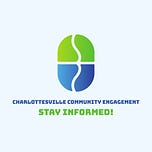

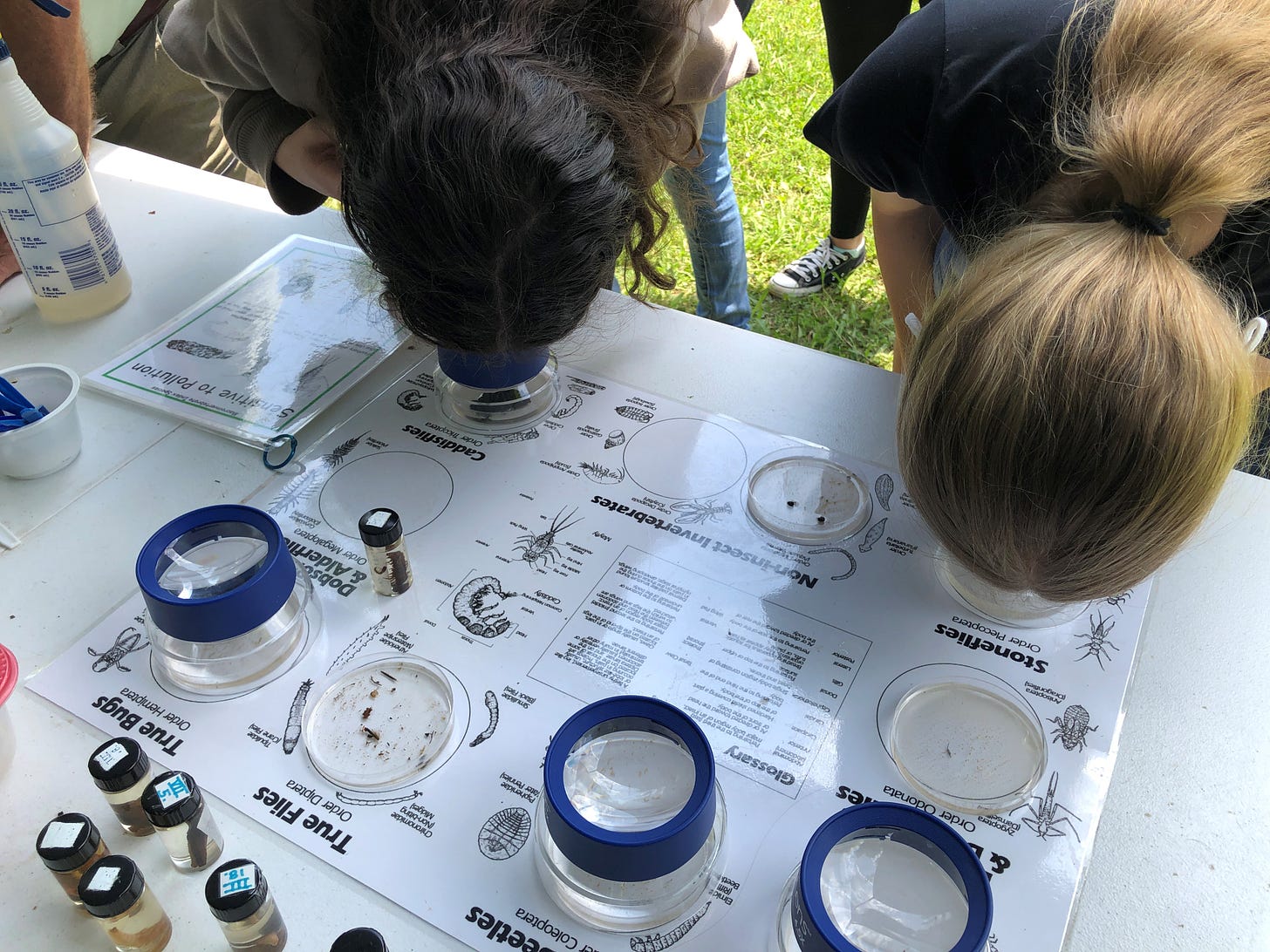

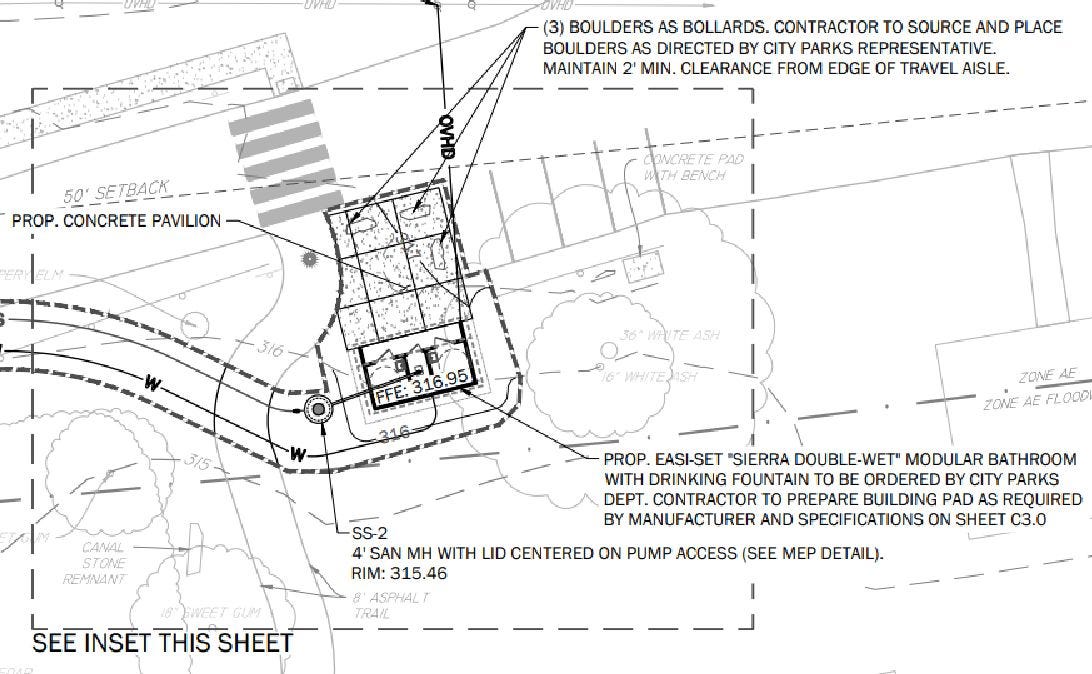
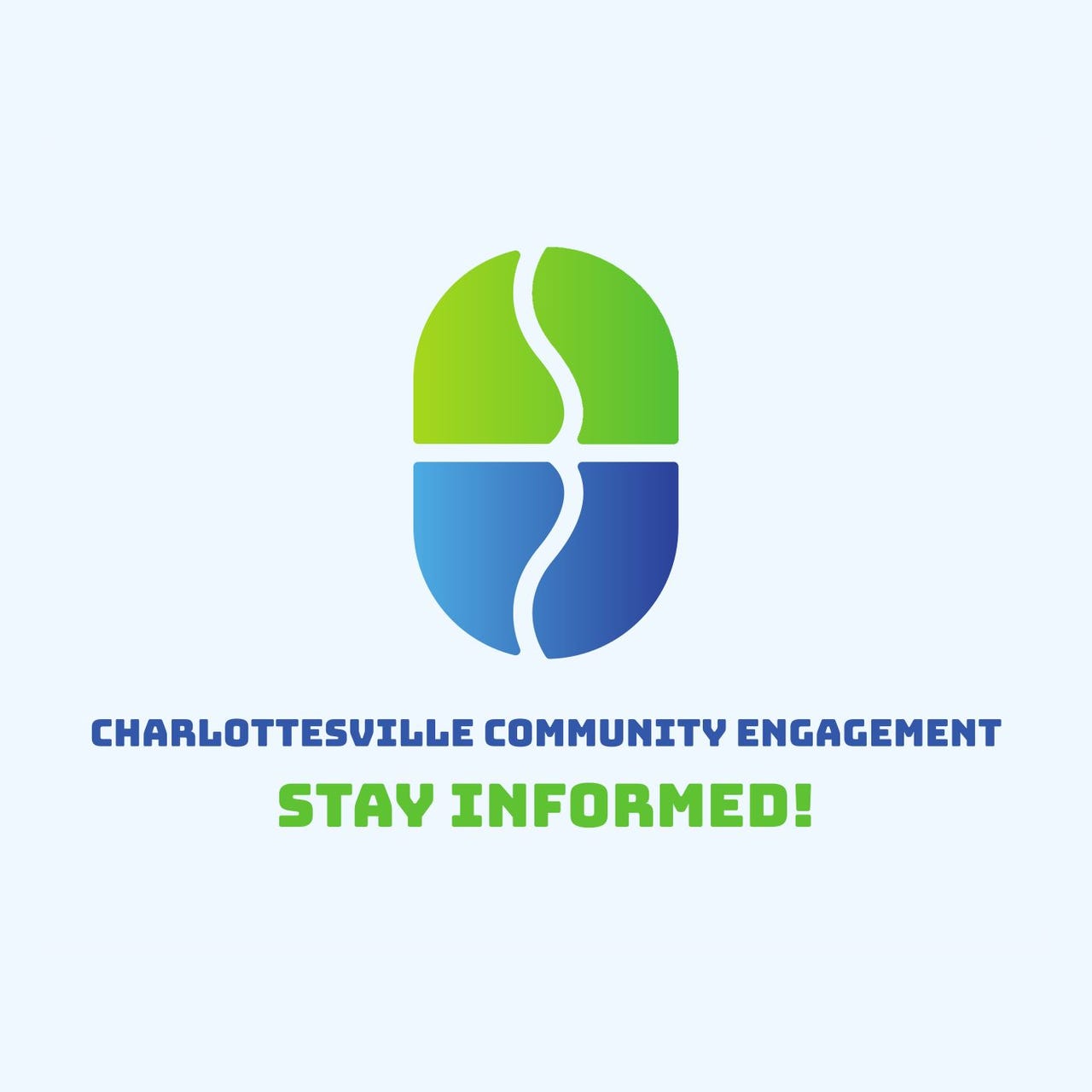
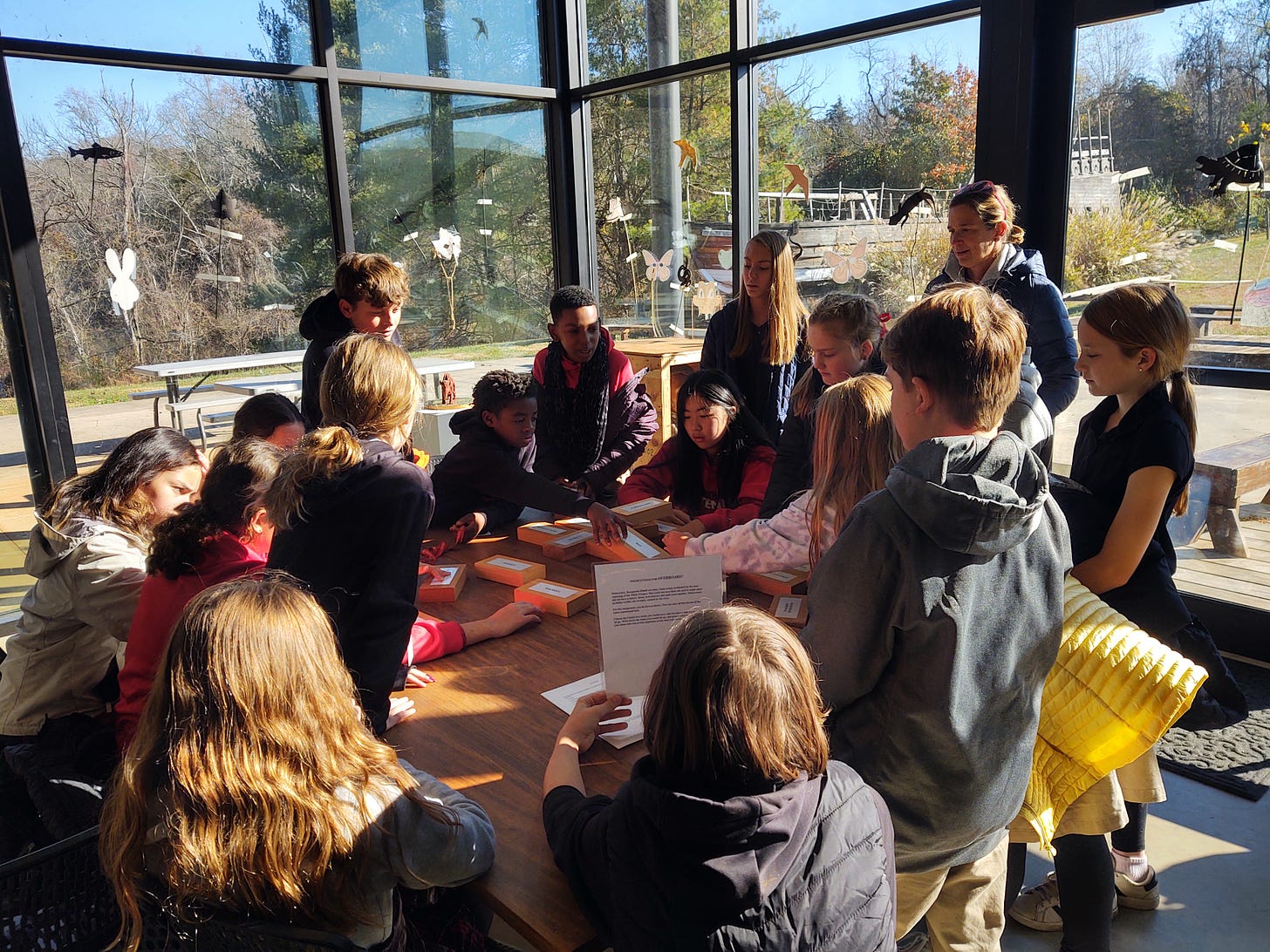



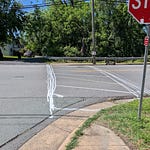






Share this post